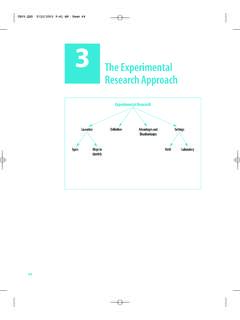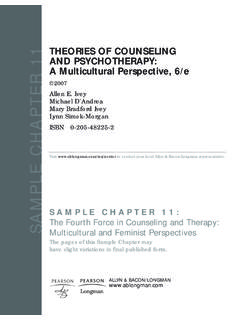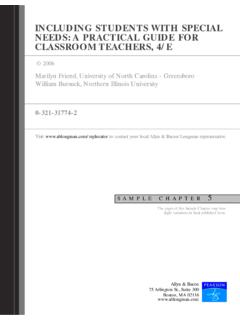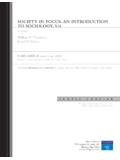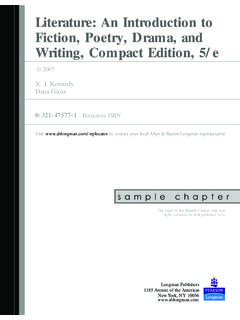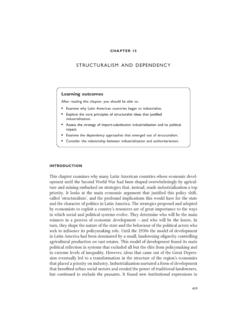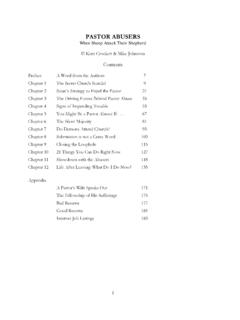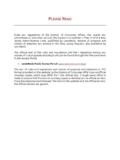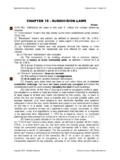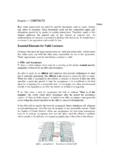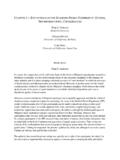Transcription of THEORIES OF COUNSELING AND …
1 THEORIES OF COUNSELING . SAMPLE CHAPTER 15. AND PSYCHOTHERAPY: A CASE. APPROACH, 2/E. 2009. Nancy L. Murdock ISBN-13: 9780132286527. ISBN-10: 0132286521. Visit to contact your local representative. Chapter 15. Narrative Therapy The pages of this Sample Chapter may have slight variations in final published form. ALLYN & BACON/MERRILL EDUCATION. 12/10/07 12:04 PM Page 490. 490 N A R R AT I V E T H E R A P Y. CHAPTER 15. Narrative Therapy Michael White The Kennedy family comes to COUNSELING in hopes of helping the eldest daughter, Rachael (17 years old), in her struggle with anorexia. David and Melanie, the parents, have been di- vorced for 4 years. Rachael's problems developed when she was 13 years old, around the time her parents separated.
2 There are two other children in the family, Jeff (age 12) and Jessica (age 15). David and Melanie report that their marriage ended because David came out.. Another factor in the couple's history was Melanie's drinking she was apparently physically abusive to the children when she was drinking, resulting in frequent conflict with David as well. Melanie reports that she has been sober for 4 years. Rachael, according to her mother, just could not handle her parents' break-up, the news that her father was gay, and her mother's entry into alcohol rehabilitation. In addition, Rachael reports that she was almost raped by an uncle when she was 15 years old. Rachael says that when the family lived together, her father was perfectionistic and demanding, insisting that she perform at the highest levels in schoolwork and athletics.
3 When she did not meet these standards, he would tell her that she was going nowhere with her life. Rachael readily admits that her anorexia is a form of passive suicide.. Rachael has been hospitalized three times for her problems and the family is referred to COUNSELING by the psychiatrist with whom she has most recently been working. Multiple forms of treatment have been attempted, including hypnosis, antidepressant medication, individual psychotherapy, music therapy, and Eating Disorders Anonymous. Rachael reported that until about a year ago she used laxatives, diuretics, and diet pills to maintain a low body weight. She currently weighs about 105 pounds and is considered severely underweight for her height.
4 She restricts her food intake and exercises several times a day. For the most part, the family is coming to therapy to see if they can help Rachael. However, David does not see how family therapy can help he sees the problem as Rachael's and states that she just needs to get her act together and start eating. 490. DESIGN SERVICES OF. 100 42 C PH/OH/CHET A M d k P N 490 K. 12/10/07 12:04 PM Page 491. N A R R AT I V E T H E R A P Y 491. BACKGROUND. Essentially, narrative therapists see life as a process of storytelling. Narrative Therapy (NT). is a relatively recent development and it is firmly situated in the social constructivist ap- proach to psychotherapy. For some, what is disconcerting about this approach is that there is no one True Story.
5 I will have more to say on this issue later. The names most commonly associated with the NT approach are Michael White and David Epston. The bible of the theory is White and Epston's (1990) book Narrative Means to Therapeutic Ends. One hotbed of NT is the Dulwich Centre in Adelaide, Australia, co-directed by Michael and Cheryl White. You can find their website at Check out for David Epston's website. In Box , you'll find a selection of Michael White's writing about a client, Robert, that will give you a sense of how he thinks about his work. Box A Case from Michael White Robert was referred to therapy over abusive behavior in relation to his partner and one of his children. This abuse had only been recently disclosed.
6 He had agreed to leave the family home, and the appropriate police and court measures were in the process of being instituted. During our early contact, discussion centered on Robert's responsibility for perpe- trating the abuse,* on the identification of the survivors' experiences of abuse, on the real short-term and possible long-term traumatic effects of this on the life of the sur- vivors, and on determining what he might do to take responsibility to mend what might be mended. Following this work, I asked Robert whether he would be prepared to join me in some speculation about the conditions and the character of men's abusive behavior. This he agreed to do, so I asked him a series of questions within the category of those represented below: If a man wanted to control and to dominate another person, what sort of structures and conditions could he arrange that would make this possible?
7 If a man desired to dominate another person, particularly a woman or a child, what sort of attitudes would be necessary in order to justify this? If a man decided to make someone his captive, particularly a woman or a child, what sort of strategies and techniques of power would make this feasible? During this speculation, particular knowledges about men's ways of being that are subjugating of others were articulated, techniques and strategies that men could rely upon to institute this subjugation were identified, and various structures and conditions that support abusive behavior were reviewed. I then asked Robert to determine which of these attitudes he had given his life to, which of these strategies had been dominant in shaping his relationships with others, and which of these conditions and structures had provided the framework for his life.
8 This was followed by further discussion centered on 12/10/07 12:04 PM Page 492. 492 N A R R AT I V E T H E R A P Y. a review of the historical processes through which Robert had been recruited into the life space that was fabricated of these attitudes, techniques, and structures. Robert was invited to take a position on these attitudes, strategies, and structures. Would he continue to subject his life to this particular knowledge of men's way of being? To what extent did he think it was reasonable to live life as power's instrument, . as an instrument of terror? To what extent did he wish to cooperate with these strategies and tactics that so devastated the lives of others? In view of his developing understand- ing of the real effects of his actions, did he think it acceptable to depend upon these structures and conditions as a framework for his life?
9 As this work progressed, Robert began to experience a separation from these attitudes and an alienation from these structures and techniques of power and control. His previ- ously familiar and taken-for-granted ways of being in relation to women and children . and for that matter, his previously familiar and taken-for-granted ways of being with other men no longer spoke to him of the truth of who he was as a man. For Robert to challenge his abusive behavior no longer meant taking action against his own nature, . and he was now able to take entire responsibility for the abuse that he had perpetrated on others. In the space that Robert stepped into as a result of this separation, we were able to find various unique outcomes, that is, occasions upon which his behavior had not been compelled by those previously familiar and taken-for-granted ways of being as a man.
10 I asked Robert to evaluate these unique outcomes. Did he see these outcomes as desirable? Did he feel positively about them? Or were they of no consequence to him? As Robert concluded that these outcomes were desirable, I asked him to share with me how he had reached this conclusion. As our work progressed, the identification of these unique outcomes provided a point of entry for an archeology of alternative and preferred knowledges of men's ways of being, knowledges that Robert began to enter. For example, in response to my encouragement to give meaning to these unique outcomes, to determine what ways of being as a man were reflected in them, Robert recalled an uncle who was quite unlike other men in his family; this was a man who was certainly compassionate and non-abusive.
